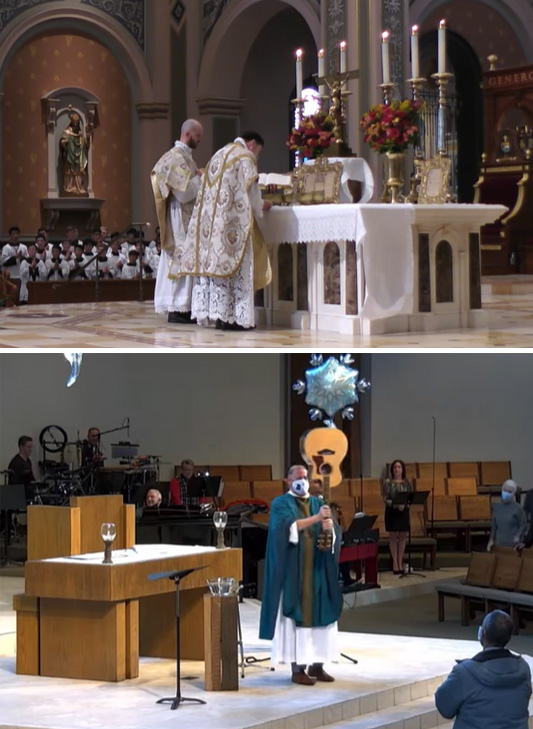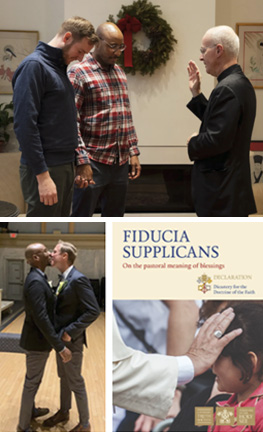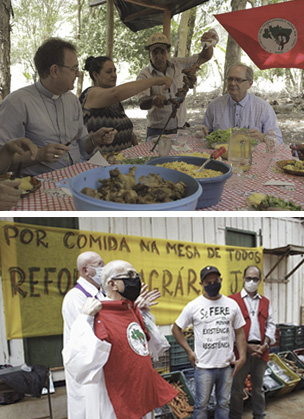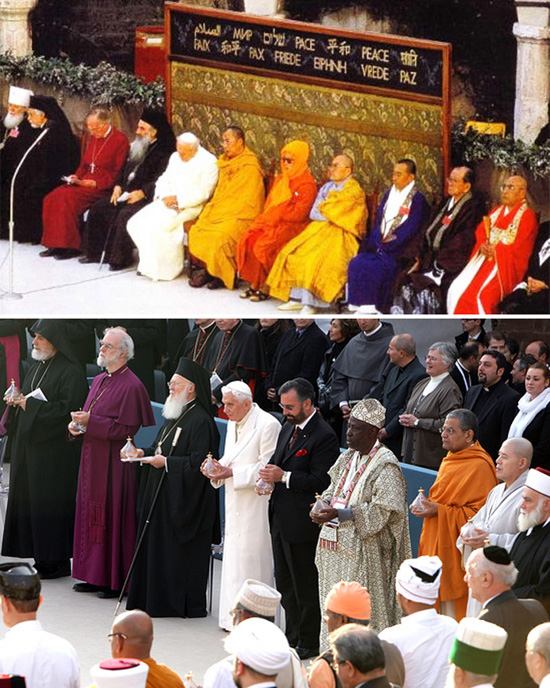 |
 |
 |
 |
 |
 |
 |
Vatican II Institutionalized
Progressivism in the Church

The institutionalization of Progressivism: the Traditional Mass vs the New Mass
They did this at Vatican II, by using many different artifices to fool conservative Bishops and impose submission. These artifices include ambiguity in the theological qualification of the Council (pastoral vs dogmatic), as well as ambiguity (including deliberate contradictions) in the letter of its documents.
After progressivists won at Vatican II, Progressivism spread throughout the Church and has invaded every area of Church life.
The following consequences of Vatican II were implicit behind the ambiguity, and have been admitted by conciliar Popes, prelates and theologians. Each section below outlining the changes contains quotes from progressivist theologians and prelates that substantiate the affirmations in the section. Many more quotes can be found in Atila Guimarães'' Collection on Vatican II in the volumes listed in the footnotes.
1. Changing the Faith & Morals
Until Vatican II, the Church had always preached that the Faith is objective (taught by God through Revelation), absolute (complete and perfect), abstract (beyond external reality & in the realm of ideas), universal (applying to everyone and everything), fixed (never changing) and one (not divided).

A change in morals follows a change of Faith. Above: Fr. James Martin blesses a homosexual couple, which was sanctioned by Fiducia Supplicans
Fr. Joseph Ratzinger (future Pope Benedict XVI who worked behind the scenes as a priest in the Council) called the doctrine of the Church an “anguishing burden” and considered the dogmas of the Church “troubling”:
“What really troubles us about the Christian faith is, to a large extent, the weight of the plethora of theses [dogmas] that have accumulated through the course of History and now present themselves demanding the assent of faith. ... People want to be liberated from it just as much as from the old-fashioned faith, which by its contradiction of modern knowledge has become an anguishing burden to them.”
Fr. Marie-Dominique Chenu (Council perito) affirmed the Council assumed a relative concept of the Faith: “The word ‘relative’ was feared at that time - incidentally, it continued to be so up until the Council. ‘Official’ theology considered the formulas that expressed the faith as immutable realities and rejected the very word evolution that the Council was to introduce into its vocabulary.” (1)
2. Adapting the Church to world (aggiornamento)
Since her birth, the Church’s policy toward the world was to influence the temporal sphere with the principles of the Gospel, while keeping her integrity and intervening when needed. At a moment when the world was being led by the Revolution backed by the Secret Forces, the Conciliar Popes took a new direction and said: Adapt the Church to the world (Italian aggiornamento).

Adapting religious life to the world: top left to right: a modified nun's habit; a weightlifting nun; bottom, former Italian singer-nun Suor Cristina, now apostatized & wearing immoral lay clothing
Pope John XXIII affirmed that Vatican II’s main task was to adapt the Church to the world: “The ecumenical council will reach out and embrace under the widespread wings of the Catholic Church the entire heritage of Our Lord Jesus Christ. Its principal task will be concerned with the condition and modernization (aggiornamento) of the Church after 20 centuries of life.” (28 June 1961)
Fr. Hans Urs von Balthasar called the Church’s past policy “repressive”: “The collapse of the internal unity and the razing of the external bastions has had repercussions... [Today] the Church has a greater sensibility; her awareness of the world, which had been harshly repressed, has re-established itself...”
Fr. Karl Rahner (Council perito) defended that all laws, prohibitions and ideologies must be destroyed: “Today’s man has ... an almost radical need to demythologize everything, to tear down all the façades, to do away with every prohibition, and to question what will remain after we will have suppressed all laws and destroyed all ideologies.” (2)
3. Secularization
The error of secularization comes from the wrong idea of aggiornamento. In the past Christendom always received much influence from the Church and was made sacral (sacralized) by her. Progressivists, on the other hand, sought to sever this influence through secularization.

A product of secularization was importing Communism into the Church through Liberation Theology. Above: Bishops & priests support the communist Landless movement in Brazil,
Fr. Edward Schillebeeckx (key adviser to the Dutch bishops at Vatican II) affirmed that secularization and socialism characterize the current attitude of the Progressivist Church: “The discovery of the human being in his full secularism ... fundamentally characterizes the present-day behavior of the Church. Today’s Church ... must believe more than ever in man. The spiritual and temporal goods ... must be fraternally shared among men ... This earthly Socialism ... is a sign that points to Christ.”
Von Balthasar affirmed that this secularization is a product of the Enlightenment and that her previous doctrine was “primitive” and a “naive usurpation”: “It was Voltaire, and a little before him, Vico, who went beyond this meaning of history characterized by the primitive theology, and favored instead a secular history of civilization. ... This secularization should not be too greatly deplored, since the old naive identification of salvation history with the history of the world was a usurpation.” (3)
4. Ecumenism
Another fruit of aggiornamento is ecumenism, which states the Church should open herself to the false religions. This conciliar ecumenism denies the Church’s unicity – only she holds the means of salvation for men – and the missionary character of the Church.

The Conciliar Popes have prayed with pagans, Muslims, Jews & heretics at Assisi since 1986
Leo XIII in the Encyclical Satis cognitum affirmed: “The Church of Christ is one and the same forever. Whoever leaves her departs from the will and command of Our Lord Jesus Christ; leaving the path of salvation, he enters that of perdition.” (4)
Progressivism, on the other hand, seeks to establish a Panreligion by uniting with the false religions.
Schillebeeckx affirmed that the Council considers non-Catholics part of the Church, and that Vatican II denied the unicity of the Church: “By admitting that other Christian communities [Protestants] are also Church, the Council made a judgment on the incapacity of the Church herself to realize the plenitude and unity desired by Christ. ... At Vatican Council II the Roman Catholic Church officially abandoned her monopoly over the Christian religion.”
Msgr. Ferdinan Klostermann, conciliar perito, advocated the union of religions, his departure point being the unification of mankind:
“Today man seems to be inside the flux of the evolution of the whole cosmos... humanity for the first time feels like a single family. ... For the first time, the Church has the conditions to truly be the Church of the world ... creating possibilities ... for that spiritual universalism initiated by the final ‘axial period’ and crowned by the presence of Christ.” (5)
5. Spirit of the Council: Tolerance for Error & Evil
Having seen these changes brought about by Vatican II, what could be behind them?
Fr. Karl Rahner, conciliar perito, famously stated: “What is most important in this Council is not the letter of the decrees it promulgated ... its spirit, its more advanced tendencies, this is what is the most important.” (6)
To summarize, behind all these changes is the spirit of the Council, which can be defined as a tolerance for error and evil, and a hatred for the Church’s magisterial, militant, sacral and hierarchical aspects. (7)
This new Spirit is what has been causing destruction in the Church for the last 60 years. For those interested in knowing more about the doctrine behind Vatican II as well as its fruits, I would recommend reading Mr. Atila Guimarães 11-volume Collection, as well as watching the video supplements, which summarize each volume..

A new Spirit brought into the Church by Vatican II's periti. left to right: Frs. Yves Congar, Henri de Lubac, Hans Urs von Balthasar, Karl Rahner, Marie-Dominique Chenu
- Source for the quote of Ratzinger and Chenu in Section 1 on Changes to the Faith and Morals: Atila Guimarães, Inveniet Fidem (Will He Find Faith?), Vol. 6 of the Collection on Vatican II, pp. 27-29.
- Source for the quotes of von Balthasar and Rahner in section 2 on adaptation to the world: Animus Delendi II, Vol. V, p. 82.
- Source for the two quotes of Schillebeeckx and von Balthasar in section 3 on secularization: Atila Guimarães, Animus Delendi II, Vol. V of the Collection on Vatican II, pp. 72-73..
- Source for the quotes of Pope Boniface VIII and Leo XIII: Animus Delendi II, pp. 205-206
- Source for the quotes of Schillebeeckx and Klostermann in section 4 on Ecumenism: Animus Delendi II, p. 283, 344.
- Statement by Karl Rahner in Anton Holzer, Vatikanum II - Reformkonzil oder Konstituante einer neuen Kirche, Basel: Saka, 1967, p. 324.
- Animus Injuriandi I, introduction, p. 17.

 Volume I |
 Volume II |
 Volume III |
 Volume IV |
 Volume V |
 Volume VI |
 Volume VII |
 Volume VIII |
 Volume IX |
 Volume X |
 Volume XI |
 Special Edition |


